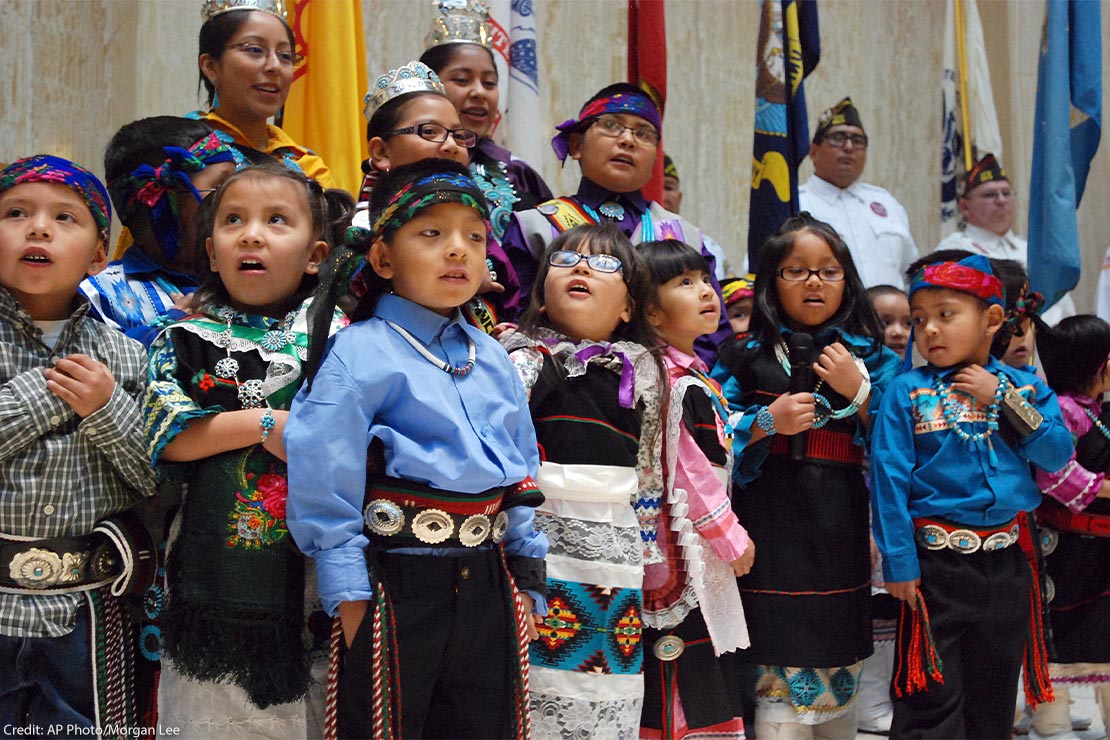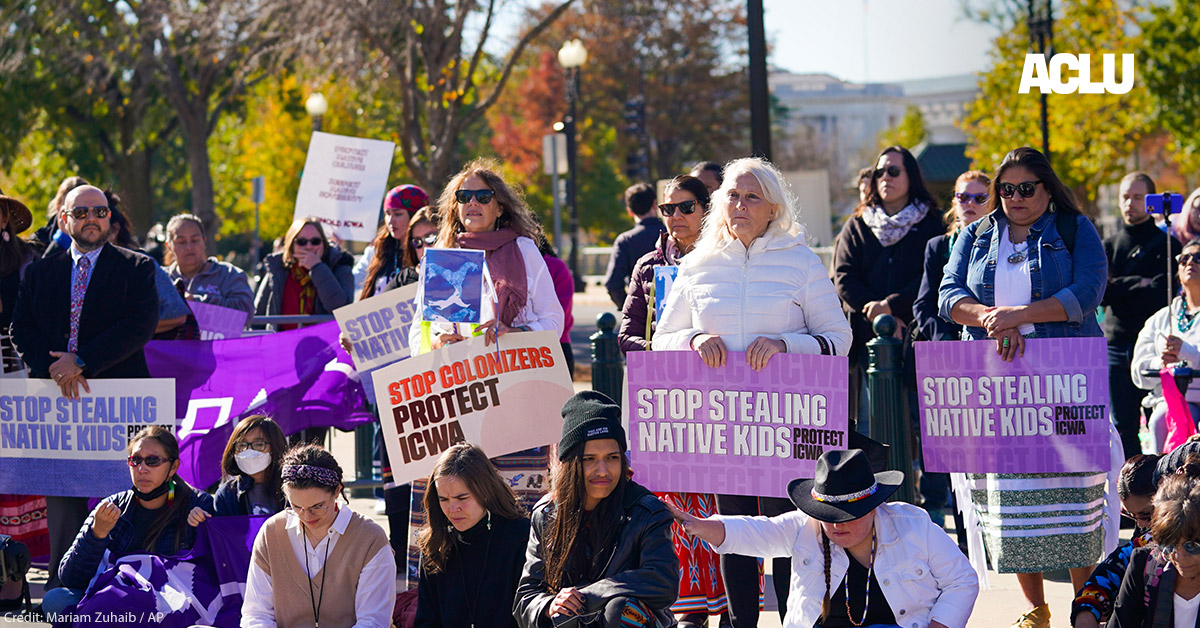Last month, the Supreme Court issued a decision in Haaland v. Brackeen, delivering a landmark victory for tribal sovereignty, Native children, Native families, and the future of Native people. In a 7-2 decision by Justice Amy Coney Barrett, the Court rejected all of the constitutional challenges to the Indian Child Welfare Act (ICWA) — some on the merits and others for lack of standing.
The ACLU submitted an amicus brief in the case, and has been following the issue closely because of the profound threat it poses to Indigenous communities, particularly federally recognized tribes in the United States. In light of this victory at the Supreme Court, we are now urging states to take action and introduce or strengthen existing state-level ICWA protections.
Understanding the Indian Child Welfare Act
ICWA was passed in 1978 to establish basic requirements to protect Native American children from removal from their homes and communities. These protections are essential given centuries-long attempts to destroy Native peoples through genocide and massacres, forced assimilation, and legalized kidnapping during the boarding school era. Native people are also deeply overrepresented within the family regulation system, where unfamiliar cultural practices and poverty were (and are) consistently misused to tear apart Indigenous families and communities and place Native children with white, Christian families.
Before ICWA, approximately one third of Native American/Alaska Native children were taken from their homes by state welfare agencies and private adoption agencies, and a shocking 85 percent of those children were placed outside of family or community care with non-Native people. ICWA sought to change these devastating policies and practices by creating heightened procedural protections when Native children face removal, and creating preferences for foster or adoptive placement with extended family, the child’s tribe, or another tribe.
Unpacking the Supreme Court’s Decision
In Brackeen, non-Native couples and the state of Texas attacked ICWA on four grounds: congressional power, the anticommandeering doctrine, equal protection, and nondelegation. On the first two grounds, the victory was decisive. The court reaffirmed that “Congress’s power to legislate with respect to Indians is well-established and broad.” While the court cautioned that the power of Congress is not unlimited, its positive references to precedent regarding criminal law, domestic violence, employment, property, tax, and trade make major upheavals on this issue in the future unlikely.
The court’s anticommandeering analysis was equally decisive. In a nutshell, the anticommandeering doctrine says that the federal government can’t require states to adopt federal law or use state resources, funds, or personnel to enforce federal law. Leveraging this argument, ICWA’s opponents argued the law violated the 10th Amendment — a misreading of the doctrine that could’ve upended the longstanding balance between federal and state law and the rights of Native people to be free from discrimination and governmental abuse. But the court’s decision makes clear that ICWA applies to both state and private actors, and, where the law does require state courts to apply federal law, well, that is just how preemption works. On these issues, the decision sends a clear message to ICWA opponents that these attacks on the federal government’s ability to shape state law and policy on matters of tribal sovereignty have no legal foundation.
The court did not entertain the incredibly far-reaching equal protection arguments urged by plaintiffs or the nondelegation doctrine, finding that none of the plaintiffs had standing. The plaintiffs sought an injunction against federal officials, but it is state officers who apply ICWA, in state court proceedings. The court reasoned that a decision on equal protection would not rectify the plaintiffs’ asserted injury — that non-Native parents are on unequal footing with Native parents given ICWA’s placement preferences. And Texas doesn’t have equal protection rights to advance.
Looking to the States
We hope this decision will lay to rest the attacks on tribal sovereignty. However, the ACLU will continue to monitor the corporate-backed powers that pushed this case to the high court for any sign of further attacks on ICWA, along with other laws impacting federal y-recognized tribes.
Now that the Supreme Court has reaffirmed ICWA’s validity, states must act swiftly to pass their own state ICWA laws to strengthen the implementation of the federal law. As outlined below, several states have already passed such laws. The ACLU urges states that have not yet done so to act now. ICWA creates a floor of strong protections, but states are free to build on this foundation and further support tribal child welfare systems. And where the Supreme Court has identified limitations on what federal ICWA requires — for example, in the context of searching for placements that satisfy ICWA’s preferences — states can and should require more. States are also well poised to work with Tribal nations to craft their own ICWA laws that cater to specific issues that might arise in their jurisdiction.
As states develop this legislation, lawmakers should codify protections that go beyond the federal legislation — as many states have already done. For example, Washington State’s ICWA law states that when Native children are removed from the home, preference must go first to extended family, whether Indian or non-Indian, then to tribal and other Indian homes near the child’s home. While we encourage state legislatures to look to other states that have adopted their own ICWA laws, we recognize that each state is unique — especially in regard to the varying characteristics and needs of its Native American constituents. States must engage with leaders from Tribal nations at each step of the way.
For states that already have ICWA legislation on the books, we again encourage lawmakers to engage in meaningful consultation with their Native American constituents and leaders from Tribal nations in their state. Lawmakers should ask whether current state ICWA laws are meeting the needs of their communities, and if there are areas for improvement, we urge them to act quickly to protect Native families.
Published July 11, 2023 at 11:09PM
via ACLU https://ift.tt/xRvN2a1


No comments:
Post a Comment